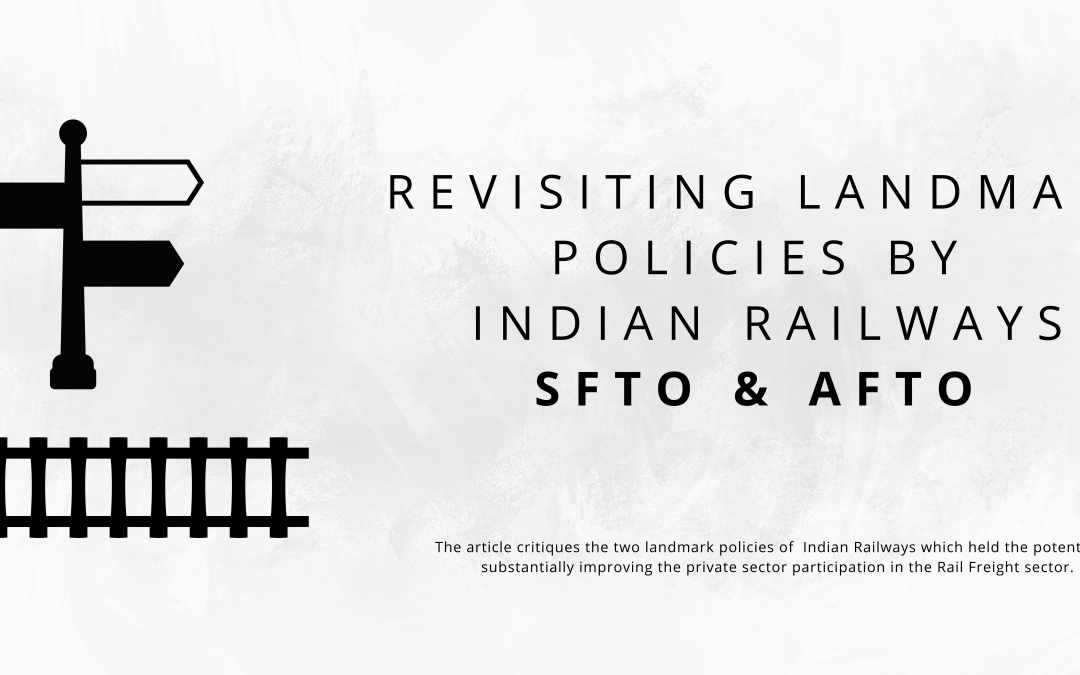The Indian Railways is the largest railway network in Asia and one of the largest in the world. In an effort to increase its competitiveness and provide better services to its customers, the Indian Railways has introduced two policies – the Special Freight Train Operator (SFTO) policy and the Automobile Freight Train Operator (AFTO) policy. These policies are aimed at promoting private sector participation in the rail sector and improving the quality of freight services offered by the Indian Railways.
SFTO (Special Freight Train Operator) Policy
The SFTO policy was introduced in 2006 with the aim of encouraging private sector participation in the rail sector and improving the quality of freight services offered by the Indian Railways. The policy allows private companies to operate freight trains on the Indian Railways network. The private companies are responsible for the procurement of wagons, locomotives and other equipment, as well as the maintenance and operation of the trains. This allows the Indian Railways to focus on its core operations and improve the quality of its services.
Under the SFTO policy, private companies are able to offer a wider range of services to customers, including door-to-door delivery, transit warehousing and other value-added services. This was envisaged to increase competition in the freight sector and to improve the quality of services offered by the Indian Railways. The SFTO policy was meant to increased private sector investment in the rail sector, which may help modernizing the rail network and improve its competitiveness.
Under the SFTO policy, private sector companies are allowed to operate dedicated freight trains on specific routes, with the Indian Railways providing the necessary infrastructure and support services. The private sector companies are responsible for the marketing of their services, the procurement of rolling stock, and the management of their trains. The Indian Railways receives a haulage charge for the use of its infrastructure and services.
The SFTO policy also provides for a revenue-sharing arrangement between the Indian Railways and the private sector companies. The revenue generated from the freight trains operated by private sector companies is divided between the Indian Railways and the private sector companies based on a pre-agreed formula.
In conclusion, the SFTO policy of the Indian Railways was introduced with the aim of promoting private sector participation in the rail sector and improving the quality of services offered by the Indian Railways. The policy allows private sector companies to operate dedicated freight trains on specific routes, with the Indian Railways providing the necessary infrastructure and support services. The policy also provides for a revenue-sharing arrangement between the Indian Railways and the private sector companies.
AFTO ( Automobile Freight Train Operator) Policy
The AFTO policy was introduced in 2008 with the aim of improving the quality of services offered by the Indian Railways for the transportation of automobiles. The policy allows private companies to operate dedicated automobile freight trains on the Indian Railways network. The private companies are responsible for the procurement of wagons and other equipment, as well as the maintenance and operation of the trains.
The AFTO policy is similar to the Special Freight Train Operator (SFTO) policy, but it is specifically designed for the transportation of automobiles.
Under the AFTO policy, private sector companies are allowed to operate dedicated automobile freight trains on specific routes, with the Indian Railways providing the necessary infrastructure and support services. The private sector companies are responsible for the marketing of their services, the procurement of rolling stock, and the management of their trains. The Indian Railways receives a haulage charge for the use of its infrastructure and services.
The AFTO policy also provides for a revenue-sharing arrangement between the Indian Railways and the private sector companies. The revenue generated from the automobile freight trains operated by private sector companies is divided between the Indian Railways and the private sector companies based on a pre-agreed formula.
In summary, the AFTO policy of the Indian Railways was introduced with the aim of promoting the transportation of automobiles by rail and increasing the competitiveness of the Indian Railways in the automobile transportation market. The policy allows private sector companies to operate dedicated automobile freight trains on specific routes, with the Indian Railways providing the necessary infrastructure and support services. The policy also provides for a revenue-sharing arrangement between the Indian Railways and the private sector companies.
Criticism
The SFTO and AFTO policies of the Indian Railways have been widely criticised for a number of reasons. One of the main criticisms of these policies is that they have not been as successful in improving the quality of services offered by the Indian Railways as was originally intended. Despite the introduction of private sector participation in the rail sector, many customers still complain about the quality of services offered by the Indian Railways, and there have been instances of delays and other operational problems.
Another criticism of the SFTO and AFTO policies is that they have not led to a significant increase in private sector investment in the rail sector. Many private companies have been reluctant to invest in the rail sector due to the high costs involved and the lack of regulatory certainty. As a result, the Indian Railways has had to rely on public sector funding to modernize its network and improve its competitiveness
The SFTO and AFTO policies have also been criticized for not addressing some of the underlying problems faced by the Indian Railways. For example, the policies have not been effective in addressing issues related to the efficiency of the rail network, such as the need for better infrastructure and more modern equipment. The policies have also not been effective in addressing the issues related to the safety of the rail network, such as the need for better track maintenance and improved signalling systems.
Conclusion
While the SFTO and AFTO policies of the Indian Railways were intended to improve the quality of services offered by the Indian Railways and promote private sector participation in the rail sector, they have not been as successful as was originally intended. The policies have been criticized for not addressing some of the underlying problems faced by the Indian Railways, and for not leading to a significant increase in private sector investment in the rail sector. The Indian Railways will need to continue to address these issues in order to improve its competitiveness and provide better services to its customers
These policies have the potential to significantly improve the way rail network is utilized and improve its competitiveness, and these policies may prove to be instrumental in increasing the efficiency and reliability of the rail network. The Indian Railways is well placed to continue to improve its services and increase its competitiveness in the future.
However, Indian Railways need to develop a mechanism & institutionalize it to interact with the private sector players and user industries on continual basis. This will require major overhaul in the thought process on the part of Indian Railways. But if it is done , it will definitely be great not only for the Indian Railways but also for the entire economy.
CONTACT US
For any queries on logistics, transportation & supply chain business and technology, please mail us at:

